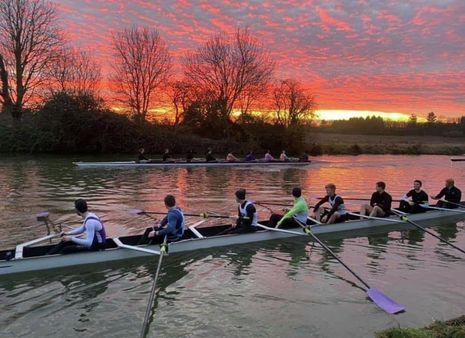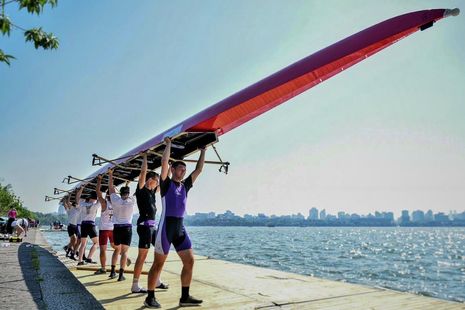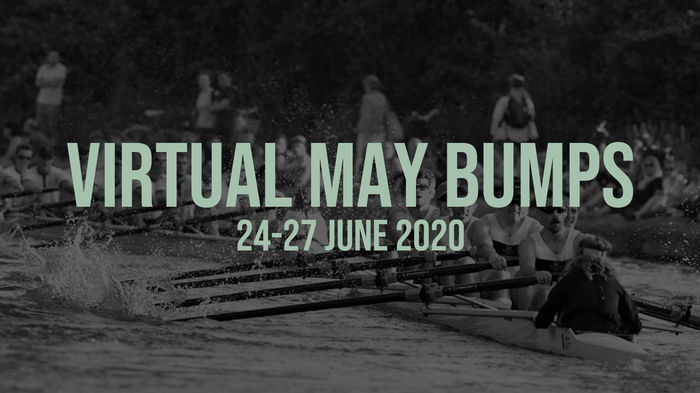The unique community of college rowing in Cambridge
Amanda McHugh reminisces about her time as a college rower and praises the team spirit and community of her club.

Rowing is traditionally thought of as the sport of ‘toughs’, but at that time the King’s Boat Club was an odd mixture of those born tough and of intellectuals in search of a counter-irritant.
- Denis Williams
These words, written by a friend of Alan Turing’s, recall the circumstances that led to their friendship. King’s College Boat Club is a place where those who want to push themselves to their limits coexist happily with those who simply row for the enjoyment of paddling up the River Cam on cold winter mornings or late summer afternoons. On top of his myriad rowing successes, including winning blades in Mays 1935, Turing also “achieved a certain distinction by swallowing a pint (of beer) in one draught” according to Williams. This does not even touch on the most famous successes in his life, some of which he attributed to discussions in the boat. Turing embodies the multiplicity of college rowers, being a well-rounded athlete as part of a far larger picture.
College rowers are faced with the extensive responsibilities of both student and athlete. Alongside the need to balance social lives, workload, and other interests with sport, graduation is always on the horizon, and as soon as a rowing career has started, it comes to an end. The turnover in college clubs is incredibly high and, in smaller clubs especially, it’s possible to go from total beginner to First VIII within 8 weeks, simply because spaces need filling.
This means rowers who find themselves in a top crew in Lent Bumps may only be doing their second term of rowing. Equally, they row alongside those who, especially come Mays (when the Blues return to college clubs), have been rowing for years. But rowing does not allow for the best in the boat to have standout individual performances. It is a matter of respect and sportsmanship, and those with years of experience must work with those without to achieve the same goal. There is a sense of no-man-left-behind camaraderie that pervades the whole sport, even in the beer boats that occupy the fifth and sixth divisions of the Mays. This attitude is borne partly from a sense of duty – nobody wants to be the reason an outing is cancelled – but also a sense of what we owe to each other as athletes. There is always something to learn, especially when abilities and aims can be so greatly mixed.
“Those with years of experience must work with those without to achieve the same goal.”
This feeds directly into the off-water atmosphere and the daily running of the club. It should never be the case that someone runs for Captain simply because they think they are the best rower, or because they feel that it will guarantee respect. Being in charge is more a matter of accepting you don’t know everything (and nobody does in college rowing, since most have only been rowing for a couple of years). It is often about loving the club more than doing the sport and having the stamina to work through as much admin as there is training. This should be accompanied by the humility to admit fallibility and to accept suggestions and criticisms from the people you train alongside, or have less experience, or simply want something different from training. The other members of the club are, after all, students like you, and their ideas and suggestions no less worthy.

This way of operating has never been more necessary than in the past year. There is only so much of the traditional day-to-day working that can be carried into this strange new world, where plans that have taken weeks to devise can collapse overnight without warning. Everyone is learning how to adapt and without being collaborative, any attempt is a non-starter. Different stages of the pandemic require different solutions and they can only be found through asking each other questions and constantly evolving to suit the current need.
It’s impossible to be part of the college rowing community and not grieve for what is missing. The highs and lows of training and racing for Bumps are irreplaceable. The silence in the seconds just before the starting cannon, punctuated only by the sound of your own breath cannot be replicated in solo training. Nor indeed can the feeling of a bump, or of getting bumped, or of Boat Club Dinner and what follows. Despite our rowing careers being fleeting, college rowing has defined too much of our time at Cambridge to simply let it go when times get tough. If there’s anything that an intense training session can teach, it’s that you can survive through the toughest of moments, and your crew will carry you through. The pandemic is no different; every aspect of college rowing has engineered it for survival, even when the sport is out of reach.
 Interviews / You don’t need to peak at Cambridge, says Robin Harding31 December 2025
Interviews / You don’t need to peak at Cambridge, says Robin Harding31 December 2025 News / Unions protest handling of redundancies at Epidemiology Unit30 December 2025
News / Unions protest handling of redundancies at Epidemiology Unit30 December 2025 Comment / What happened to men at Cambridge?31 December 2025
Comment / What happened to men at Cambridge?31 December 2025 Features / ‘Treated like we’re incompetent’: ents officers on college micromanagement30 December 2025
Features / ‘Treated like we’re incompetent’: ents officers on college micromanagement30 December 2025 Theatre / We should be filming ADC productions31 December 2025
Theatre / We should be filming ADC productions31 December 2025








